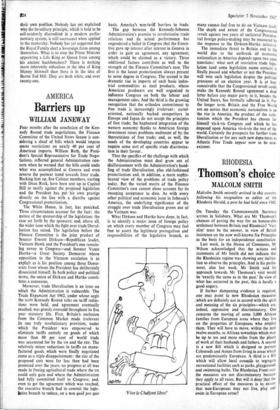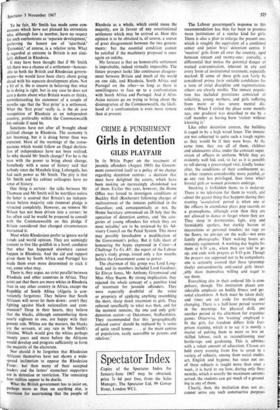Thomson's choice
RHODESIA MALCOLM SMITH
Malcolm Smith recently arrived in this country following his resignation as editor of the Rhodesia Herald, a post he had held since 1962.
On Tuesday the Commonwealth Secretary arrives in Salisbury. What are Mr Thomson's chances of paving the way for an honourable settlement between Britain and Rhodesia? 'Very slim' must be the answer, in view of British insistence on the now well-known Six Principles as the basis for an independence constitution.
Last week, in the House of Commons, Mr Wilson acknowledged that the actions and statements of Mr Smith did not indicate that the Rhodesian regime was showing any inclina- tion to observe the principles. And in his parlia- ment, also last week, Mr Smith said his approach towards Mr Thomson's visit would be 'exactly the same as in the past.' In view of what has occurred in the past, this is hardly a good augury.
If further dampening evidence is required, one may point to new Rhodesian measures which are definitely not in accord with the spirit and meaning of the six principles—which are, indeed, oppressive and discriminatory. One concerns the moving of some 3,000 African families from European areas where they live on the properties of Europeans who employ them. They will have to move, within the next twelve months, to African townships which may be up to ten and more miles from the places of work of their husbands and fathers. A second is a new Bill which is designed to prevent Coloureds and Asians from living in areas which are predominantly European. A third is a Bill which will allow local councils to segregate recreational facilities such as parks, playgrounds .and swimming baths. The Rhodesian Front says the measures are not discriminatory because they apply to all races. But will it deny thatthe practical effect of the measures is to ensure that non-Europeans may not live, play and swim in European areas?
To be fair, Mr Smith has made some con- cessions which have not pleased his extremists who, although few in number, have no respect for such euphemisms as 'separate development,' preferring the honest use of 'apartheid.' 'Extremist,' of course, is a relative term. What is regarded as extreme in Britain is not simi- larly defined in Rhodesia.
It may have been thought that if Mr Smith felt there was a chance of a settlement—honour- able to both the British and Rhodesian govern- ments—he would have been chary about going ahead with his separate development plans. Not a bit of it. He is sincere in believing that what he is doing is right, but in any case he does not care a damn about what Britain wants or thinks, notwithstanding his statement of a couple of months ago that the 'first prize' is a settlement. What the 'first prize' really is, is the de lure recognition of Rhodesia as an independent country, preferably within the Commonwealth but outside if need be.
Sanctions have not after all brought about political change in Rhodesia. The economy is not booming, but it is doing better than was expected. Most of the warnings of the conse- quences which would follow an illegal declara- tion of independence have not been realised. So why should Mr Smith change? For he is the man with the power to bring, about change. Somebody with a sense of history said that nobody since the Matabele king, Lobengula, has had such power as Mr Smith. The pity is that Mr Smith and his cabinet colleagues have no sense of history.
One thing is certain : the talks between Mr Thomson and Mr Smith will be worthless unless the latter is assured that Britain's no indepen- dence before majority rule (ronsisa) pledge is retracted completely. However, on NIBMAR Mr Wilson has not been driven into a corner; he has often said he would be prepared to consult with the Commonwealth on this pledge if Britain considered that changed circumstances warranted it.
Most white Rhodesians prefer to ignore world trends and world opinion. They are seemingly content to live like goldfish in a bowl, confident that what has happened elsewhere cannot happen in Rhodesia. And the aid and support given them by South Africa and Portugal has made them even more determined to stick it out, come what may.
There is, they argue, no strict parallel between Rhodesia and other countries in Africa. They point out that there are more whites in Rhodesia than in- any other country in Africa, except the Republic of South Africa (Algeria is con- veniently forgotten). They believe that South Africans will never let them down: aren't they fighting against black nationalism and com- munism? Deep in their hearts, they believe that the blacks, although outnumbering them nearly eighteen to one, are happy with their present role. Whites are the masters, the blacks are the servants, at any rate in Mr Smith's lifetime. Which would give the whites perhaps twenty years and more before the Africans would develop and progress sufficiently to form the majority of the electorate.
Nor should it be forgotten that Rhodesian Africans themselves have not shown a wide- spread inclination to oppose the Rhodesian Front: but then many of their accepted leaders and the tatters' staunchest supporters are in detention or restriction. The remaining four million appear to be !docile.
What the British government has to insist on, Perhaps more so than on anything else, is provision for ascertaining that the people of Rhodesia as a whole, which could mean the majority, are in favour of any constitutional settlement which may be arrived at. How this opinion is to be obtained is, of course, a source of great disagreement between the two govern- ments: but the essential condition cannot be satisfied if the machinery proposed is once again an indaba.
My forecast is that an honourable settlement is improbable, indeed virtually impossible. The future prospect looks like continuous disagree- ment between Britain and much of the world on one side, and Rhodesia, South Africa and Portugal on the other—so long as there is unwillingness to face up to a confrontation with South Africa and Portugal. And if Afro- Asian nations go on trying to bring about the disintegration of the Commonwealth, the likeli- hood of a confrontation is even more remote than at present.











































 Previous page
Previous page